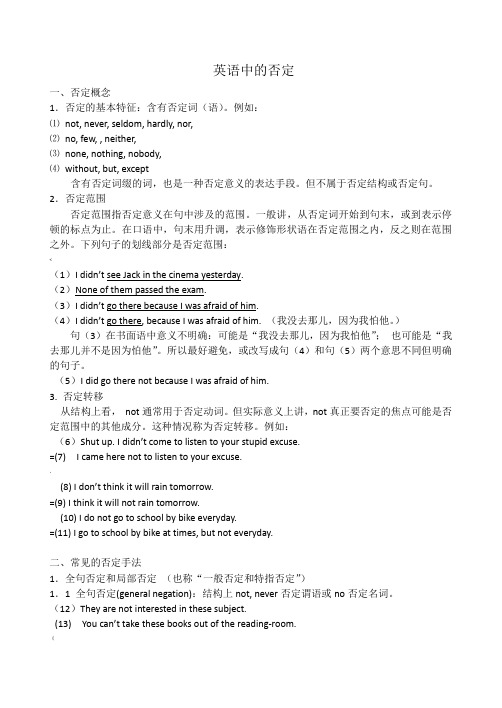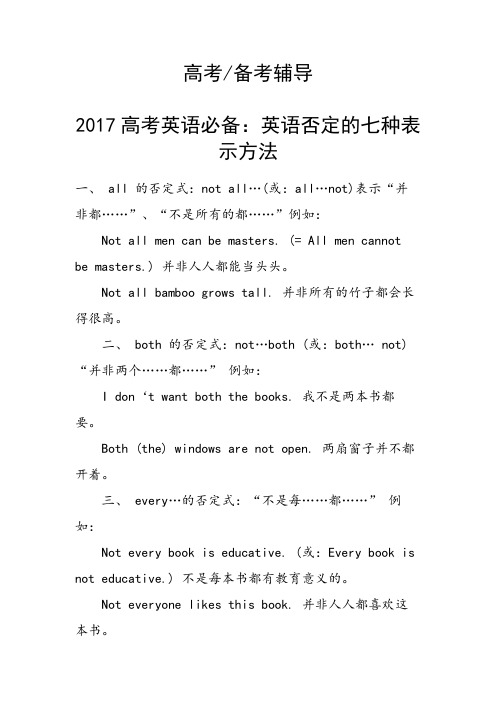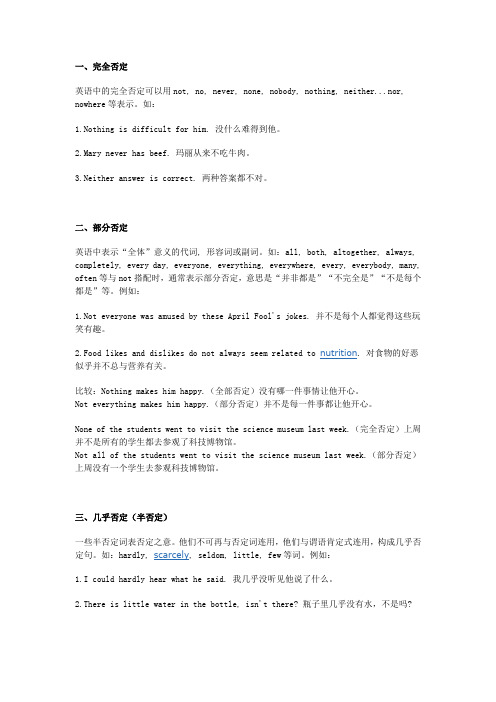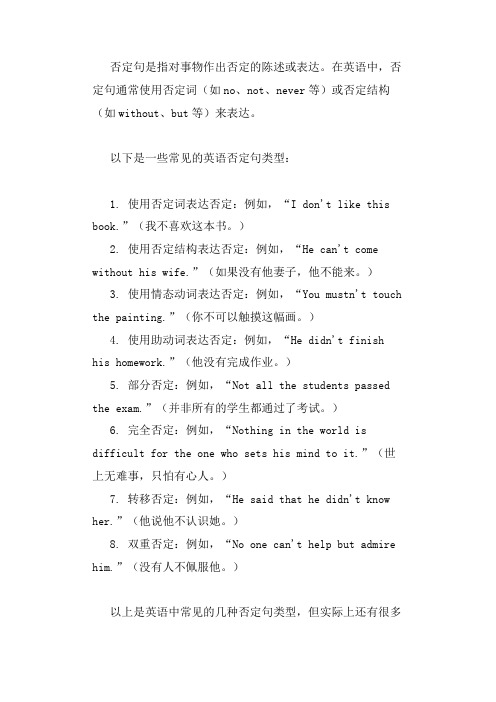英语中的否定
英语单词否定前缀规律

英语单词否定前缀规律
在英语中,有许多否定前缀可以通过在词根或词干前添加来构成. 以下是几个常见的否定前缀以及它们的意义:
1. "un-":表示否定、相反或逆转的意思。
例如:happy(快乐)→unhappy (不快乐)、able(能力)→unable(不能)。
2. "dis-":表示分开、除去或反对的意思。
例如:like(喜欢)→dislike(不喜欢)、agree(同意)→disagree(不同意)。
3. "im-" 或"in-":表示否定、不适当或逆转的意思。
例如:possible(可能)→impossible(不可能)、human(人类的)→inhuman(非人类的)。
4. "non-":表示不、非或缺乏的意思。
例如:existent(存在的)→nonexistent (不存在的)、stop(停止)→nonstop(不停的)。
5. "mis-":表示错误、不正确或错误的意思。
例如:understand(理解)→misunderstand(误解)、spell(拼写)→misspell(拼写错误)。
这些是一些常用的否定前缀,可以帮助构成否定或相反意义的词汇。
然而,并非所有词根或词干都可以与这些前缀搭配使用,有时候还需要注意词根或词干的变
化。
英语表示否定的前缀

英语中表示否定的前缀1. 前缀ab表示否定use v.使用——abuse v.滥用normal adj.正常——abnormal adj.不正常的present adj.——absent adj.缺席abandon v.放弃(abandon oneself to do sth放弃做某事)abolish v.废除2. 前缀mis表示否定misunderstand v.误解、误会mistake n.误会(make a mistake 犯错误)mislead v.误导misjudge v.误判misfortune n.不幸3. 前缀in表示否定,变体有im/ir/ilA. in用于1大多数此跟前indirect adj.间接的incorrect adj.不正确indifferent adj.漠不关心的infinite adj.无限的B. Im用于b/m/p开头的词根前impossible adj.不可能的imbalanced adj.不平衡的impatient adj.不耐心的immobile adj.固定的C. Ir用于r开头的词根前irresponsible adj.不负责任irregular adj.不规则的D. il用于l开头的词根前illegal adj.不合法的illogical adj.不合逻辑的illiterate adj.不识字的(illiteracy rate 文盲率)4. 前缀dis表示否定disagree v.不同意(disagreement n.不同意)discovery n.出现disappear v.消失(disappearance n.消失)discount n.折扣disorder n.混乱disease n.疾病disadvantage n.缺点5. 前缀de表示否定decrease v.减少——increase v.增加devaluate v.贬值deline v.衰退deforest 砍伐degenerate v.退化。
英语中的否定

英语中的否定一、否定概念1.否定的基本特征:含有否定词(语)。
例如:⑴not, never, seldom, hardly, nor,⑵no, few, , neither,⑶none, nothing, nobody,⑷without, but, except含有否定词缀的词,也是一种否定意义的表达手段。
但不属于否定结构或否定句。
2.否定范围否定范围指否定意义在句中涉及的范围。
一般讲,从否定词开始到句末,或到表示停顿的标点为止。
在口语中,句末用升调,表示修饰形状语在否定范围之内,反之则在范围之外。
下列句子的划线部分是否定范围:<(1)I didn’t see Jack in the cinema yesterday.(2)None of them passed the exam.(3)I didn’t go there because I was afraid of him.(4)I didn’t go there, because I was afraid of him. (我没去那儿,因为我怕他。
)句(3)在书面语中意义不明确:可能是“我没去那儿,因为我怕他”;也可能是“我去那儿并不是因为怕他”。
所以最好避免,或改写成句(4)和句(5)两个意思不同但明确的句子。
(5)I did go there not because I was afraid of him.3. 否定转移从结构上看,not通常用于否定动词。
但实际意义上讲,not真正要否定的焦点可能是否定范围中的其他成分。
这种情况称为否定转移。
例如:(6)Shut up. I didn’t com e to listen to your stupid excuse.=(7) I came here not to listen to your excuse.,(8) I don’t think it will rain tomorrow.=(9) I think it will not rain tomorrow.(10) I do not go to school by bike everyday.=(11) I go to school by bike at times, but not everyday.二、常见的否定手法1.全句否定和局部否定(也称“一般否定和特指否定”)1.1 全句否定(general negation):结构上not, never否定谓语或no否定名词。
高考英语必备:英语否定的七种表示方法

高考/备考辅导2017高考英语必备:英语否定的七种表示方法一、 all 的否定式:not all…(或:all…not)表示“并非都……”、“不是所有的都……”例如:Not all men can be masters. (= All men cannot be masters.) 并非人人都能当头头。
Not all bamboo grows tall. 并非所有的竹子都会长得很高。
二、 both 的否定式:not…both (或:both… not) “并非两个……都……”例如:I don‘t want both the books. 我不是两本书都要。
Both (the) windows are not open. 两扇窗子并不都开着。
三、 every…的否定式:“不是每……都……”例如:Not every book is educative. (或:Every book is not educative.) 不是每本书都有教育意义的。
Not everyone likes this book. 并非人人都喜欢这本书。
This flower is not seen everywhere. 这花并不是随处可见的。
四、 always的否定式:“并非总是(并非一直)……”例如:He is not always so sad. 他并不是一直都这样悲伤。
五、 entirely, altogether, completely 和quite 的否定式:“不完全……”,“并非完全……”例如:The businessman is never to be entirely trusted. 不可以完全信任商人。
He felt not altogether satisfied. 他并不完全满意。
I don’t agree completely. 我并不完全同意。
What he did was not quite proper. 他做的不十分妥当。
英语中必须掌握的八种否定形式

英语中的完全否定可以用not, no, never, none, nobody, nothing, neither...nor, nowhere等表示。
如:1.Nothing is difficult for him. 没什么难得到他。
2.Mary never has beef. 玛丽从来不吃牛肉。
3.Neither answer is correct. 两种答案都不对。
二、部分否定英语中表示“全体”意义的代词, 形容词或副词。
如:all, both, altogether, always, completely, every day, everyone, everything, everywhere, every, everybody, many, often等与not搭配时,通常表示部分否定,意思是“并非都是”“不完全是”“不是每个都是”等。
例如:1.Not everyone was amused by these April Fool's jokes. 并不是每个人都觉得这些玩笑有趣。
2.Food likes and dislikes do not always seem related to nutrition. 对食物的好恶似乎并不总与营养有关。
比较:Nothing makes him happy.(全部否定)没有哪一件事情让他开心。
Not everything makes him happy.(部分否定)并不是每一件事都让他开心。
None of the students went to visit the science museum last week.(完全否定)上周并不是所有的学生都去参观了科技博物馆。
Not all of the students went to visit the science museum last week.(部分否定)上周没有一个学生去参观科技博物馆。
否定句 英语 百科

否定句是指对事物作出否定的陈述或表达。
在英语中,否定句通常使用否定词(如no、not、never等)或否定结构(如without、but等)来表达。
以下是一些常见的英语否定句类型:
1. 使用否定词表达否定:例如,“I don't like this book.”(我不喜欢这本书。
)
2. 使用否定结构表达否定:例如,“He can't come without his wife.”(如果没有他妻子,他不能来。
)
3. 使用情态动词表达否定:例如,“You mustn't touch the painting.”(你不可以触摸这幅画。
)
4. 使用助动词表达否定:例如,“He didn't finish his homework.”(他没有完成作业。
)
5. 部分否定:例如,“Not all the students passed the exam.”(并非所有的学生都通过了考试。
)
6. 完全否定:例如,“Nothing in the world is
diff icult for the one who sets his mind to it.”(世上无难事,只怕有心人。
)
7. 转移否定:例如,“He said that he didn't know her.”(他说他不认识她。
)
8. 双重否定:例如,“No one can't help but admire him.”(没有人不佩服他。
)
以上是英语中常见的几种否定句类型,但实际上还有很多
其他的表达方式。
在具体语境中,需要根据具体情况选择合适的表达方式。
英语否定句的公式
英语否定句的公式
一、当句子中含有be动词时
1. 如果句子中有be动词,则在be动词后加not。
2. 如果句子中有情态动词,则在情态动词后加not。
3. 如果句子中没有be动词和情态动词,则在动词前加do或does的否定形式,再加not。
二、当句子中没有be动词和情态动词时
1. 如果句子是一般现在时,则在动词前加don't或doesn't。
2. 如果句子是现在进行时,则在动词前加am/is/are+not。
3. 如果句子是现在完成时,则在have/has后加not。
三、当句子中有助动词have/has/had时
1. 如果句子是现在完成时,则用have/has/had+not。
2. 如果句子是现在完成进行时,则用have/has/had+not+been+doing。
四、当句子中有情态动词should/shouldn't时
1. 如果句子是should+动词原形,则用should+not+动词原形。
2. 如果句子是shouldn't+动词原形,则用shouldn't+动词原形。
五、当句子中有情态动词can/could/may/might时
1. 如果句子是can/could+动词原形,则用can't/couldn't+动词原形。
2. 如果句子是may/might+动词原形,则用may/might not+动词原形。
英语否定句的构成
英语否定句的构成在英语语法中,否定句是我们日常沟通中常常使用的句型之一。
否定句可以用来否定一个陈述或者表达相反的意思。
本文将介绍英语否定句的构成方式,包括一般句式、特殊情况以及常用的否定句词汇。
一、一般句式1. 否定动词构成在英语中,否定句一般通过在动词前加上 "do not" 或者 "does not" 来表示。
这样的构造适用于一般现在时和一般过去时的句子。
例如:- I do not like coffee.(我不喜欢咖啡。
)- She does not speak French.(她不会说法语。
)2. 助动词构成在一些特殊的情况下,我们需要根据句子的时态变化构造否定句。
对于一般现在时、一般过去时、一般将来时以及现在完成时,我们需要用到相应的助动词来构成否定句。
例如:- He is not playing football.(他不在踢足球。
)- They did not go to the party.(他们没有去参加聚会。
)- We will not travel to Europe next month.(我们下个月不会去欧洲旅行。
)- She has not finished her homework.(她还没有完成作业。
)二、特殊情况1. be 动词对于 be 动词的否定句构成,我们只需要在 is, am, are 后面加 not。
例如:- He is not happy.(他不快乐。
)- They are not my friends.(他们不是我的朋友。
)2. have 动词对于 have 动词的否定句构成,我们需要在 have 或 has 后面加上 not。
例如:- She does not have a car.(她没有车。
)- We have not finished the project yet.(我们还没有完成这个项目。
)3. 情态动词对于情态动词的否定句构成,我们需要在情态动词后面加 not。
英语中的八种否定形式,你知道吗
英语中的八种否定形式,你知道吗一.完全否定英语中的完全否定可以用not, no, never, none, nobody, nothing, neither...nor, nowhere等表示。
如:1.Nothing is difficult for him. 没什么难得到他。
2.Mary never has beef. 玛丽从来不吃牛肉。
3.Neither answer is correct. 两种答案都不对。
二.部分否定英语中表示“全体”意义的代词, 形容词或副词。
如:all, both, altogether, always, completely, every day, everyone, everything, everywhere, every, everybody, many, often等与not搭配时,通常表示部分否定,意思是“并非都是”“不完全是”“不是每个都是”等。
例如:1.Not everyone was amused by these April Fool's jokes.并不是每个人都觉得这些玩笑有趣。
2.Food likes and dislikes do not always seem related to nutrition. 对食物的好恶似乎并不总与营养有关。
比较:Nothing makes him happy.(全部否定)没有哪一件事情让他开心。
Not everything makes him happy.(部分否定)并不是每一件事都让他开心。
None of the students went to visit the science museum last week.(完全否定)上周没有一个学生去参观科技博物馆。
英语否定形式语法
“否定形式”一、显性否定1●,none,nobody,nothing,nowhere,neither,nor,neither...nor,but,without,unless,but for,but that,in the absence of,regardless of,instead of,exclusive of,short of,rather than,anything but,any more than,out of the question,would no more...than●由a-,dis-,il-,im-,ir-,un-,non-,anti-,mal-,under-等前缀及-less,-free,-proof 等后缀合成的否定词●hardly,scarcely,barely,little,few,seldom 等半否定词●avoid,ban,call off,cancel,deny,deprive,exclude,escape,evade,forbid,free...from,free from/of,fail,hate,ignore,lack,lose,miss,naught,neglect,prohibit,quit, refuse,rid,rule out,stop 以及above,against,beneath,beyond,far from,off,out of,past 和absent,bad,bare,empty,last,poor,vacant 等可用于表达否定概念的词。
这类否定句要注意如下三个问题:否定程度的强弱,说话者的态度以及否定句式表肯定概念1.He is not richer than I. 他不比我富。
2.He is no richer than I. 他和我一样,也不富。
3.He is not a statesman. 他不是政治家。
4.He is no statesman. 他绝非政治家。
- 1、下载文档前请自行甄别文档内容的完整性,平台不提供额外的编辑、内容补充、找答案等附加服务。
- 2、"仅部分预览"的文档,不可在线预览部分如存在完整性等问题,可反馈申请退款(可完整预览的文档不适用该条件!)。
- 3、如文档侵犯您的权益,请联系客服反馈,我们会尽快为您处理(人工客服工作时间:9:00-18:30)。
浅析英语中的否定编讲:田老师在教学中不难看出,影响学生英语理解和阅读的除了有单词和主从句(长难句)外,还有一些否定句子困扰学生,严重影响了学习兴趣。
现在就英语中的否定作统一的浅析以便教和学更轻松。
第一篇:否定转移和不转移问题否定转移的主句动词在语义上可分:A:表示看法的动词:be supposed to, believe, expect, imagine, suppose, think,fancy,guess,should say等表示主观意见和猜想的动词在句中作谓语时,按习惯其宾语从句的否定通常转移到主句。
如:1. I didn’t think I have seen you before. 2. She didn’t imagine that we would say anything.B:表示感觉的动词:在seem,feel,taste,sound,appear,look like, feel as if, look as if, sou nd as if作联系动词的句子中,特别是seem,按习惯以它的否定来代替其他部分的否定。
例如:1. The baby doesn’t appear to be awake.2. It doesn’t look(看起来)like it’s (天不会)going to rain.3.English doesn't seem easy to learn. 英语好像不容易学。
4.It didn't seem during those years that therecould be anyone else who might share my own peculiar tastes. 在那些年月里,似乎没有人会有我这样的特殊情趣。
C类似的情况还有半助动词happen。
例如:He didn't happen to be at home. 他碰巧不在家。
D将seem, appear 等后的从句的否定转移到前面。
It doesn't seem that they know where to go.看来他们不知道往哪去。
It doesn't appear that we'll have a sunny day tomorrow. 看来我们明天不会碰上好天气。
E有时将动名词,介词短语或整个从句的否定转变为对谓语动词的否定。
I don't remember having ever seen such a man.我记得从未见过这样一个人。
(not否定动名词短语having…) It's not a place where anyone would expect to see strange characters on the street.在这里,人们不会想到在街上会碰上陌生的人。
(anyone 作主语时,从句中的谓语动词不能用否定形式。
)F 状语和状语从句的否定转移The ant is not gathering this for itself alone. (否定状语) 蚂蚁不只是为自己采食。
He was not ready to believe something just because Aristotle saidso. (否定because状语) 他并不因亚里斯多德说过如何,就轻信此事。
She had not been married many weeks when that man's younger brothe r saw her and was struck by herbeauty. (否定状语many weeks)她结婚还不到几个月,这个人的弟弟就看见她了,并对她的美貌着迷。
G以because引导的从句或because of引导的介词短语在句中作原因状语时,其否定常常转移。
例如:1.I don't teachbecauseteaching is easy for me., and nor do I teach because I think I know answers, or I have knowledge I feelcompelledto sharewith others. (= I teach not because… neither because…) 我当教师,并不是因为我觉得教书轻松……也不是因为我认为自己能够解答各种问题,或者因为我有满腹学问,觉得非与别人分享不可。
2.I didn't go there because of his request. (=I went there not because of his request.) 我不是因为他的要求而去的。
H 常见的句型1.当think, believe,suppose, imagine这一类动词引导一个否定概念时,通常将引导动词think变为否定。
例如:I don’t thinkyou’ve met my wife. 你大概没有见过我的妻子吧。
2.结构句型“not…because…”中的not常常是否定because所引导的状语从句,而不是否定主句的谓语动词。
例如:They did not come to the hospital because theywanted tose e me.他们来医院不是因为要看我。
再如:Tomwas not unhappy becausehewas unable togo there.汤姆并不是因为不能去那儿而感到不高兴。
比较:Hedid not go to thelecture this morning because he was sick.今早他没来参加讲座,因为他病了。
I did notwritethat letter because of what you told me.由于你给我说了,我才没有写那封信。
(或:并不是因为你跟我说了,我才写那封信。
)再如:You shouldnot lookdown upon a man because he is poor.误译:因为一个人穷,所以你不应该看不起他。
正译:你不应该因为一个人穷就看不起他。
在这个句子里,not否定的不是后面的动词look down upon,而是because he is poor。
值得注意的是,这种句型是有歧义的,我们要根据上下文排除歧义。
3.not…toTheydon’t come to see you laughed at.误译:他们不是来看你被嘲笑的。
正译:他们到这儿来并不是要看你被嘲笑的的。
在这个句子里,not否定的不是动词come,而是to see you laughed at。
更多的例子:He said, Now, look, I didn’t comehereto get along with you guys. You’re going tohave to get along with me.他说:“喂,老弟们,我到这儿来不是来听你们的,该是你们来听我的。
”二,只表示否定,但不转移下列情况的却不用进行否定转移1. 主句的谓语动词为一般过去时或过去完成时时。
例如:He thought that itwas not his duty to help Tom. 他认为帮助汤姆不是他的责任。
I had thought that he would not come.我原以为他不回来呢。
2. 主句的谓语动词为过去进行时时。
例如: Mary was thinking the room was not hot enough.玛丽在想那房间还不够热。
We were thinkingthey couldnot receive our demands.我们在想他们不可能接受我们的要求。
3、主句的谓语动词为现在完成时或现在完成进行时时。
例如: We have supposed we will not trouble you again.我们想我们不会再麻烦你了。
I have been thinking that the skywon’t fall down.我相信天不会塌下来。
4、当think用在疑问句中时,一般不要求否定转移。
Why do you think we can’t change your note? 你为什么认为我们换不开你的钞票呢?Do you think my mother wouldnot permit this? 你认为我妈妈不会答应吗? 5、当主句中的谓语动词与情态动词连用时,不属于否定转移。
例如:The boss mus t think I am not fit for the job.老板一定认为我不适合这项工作。
You can’t think how glad I am to see you. 你无法想象我见到你是多么高兴。
6、当主句中的谓语动词与状语连用时,不属于否定转移现象。
例如: I didn’t thin k that they were happy. 我并不认为他们是幸福的。
I really think youneedn’t worry about him.我真认为你没必要为他担心。
7、当主句中的谓语动词被加强语气的助动词do, does, did修饰时,否定不转移。
例如:I do think it is wise of her to say so.我确实认为她这么说是明智的. I do believe she doesn’t tell a lie. 我真的相信她没有撒谎。
8、当宾语从句中有no, never, hardly等否定词时,否定通常不转移。
例如:We all think that she is aperson for nothing.我们都认为她是一个不中用的人。
I believe Tom never tellsa lie.我相信汤姆从来不撒谎。
9、当宾语从句中含有not at all, not a bit, not…enough, can’t help doing 等一些固定词组时,否定不转移。
例如:Ithink she is not tiredat all.我想她一点也不累。
I think I can’t help laughing if I see it.我想我看见它时会忍不住大笑。
第二篇,英语中的否定转化(否定形式,肯定意义)一、转换否定形式上否定而意义上则表肯定的句子。
1.cannot…tooYoucannot be too careful.误译:你不能太小心。
正译:你越小心越好。
